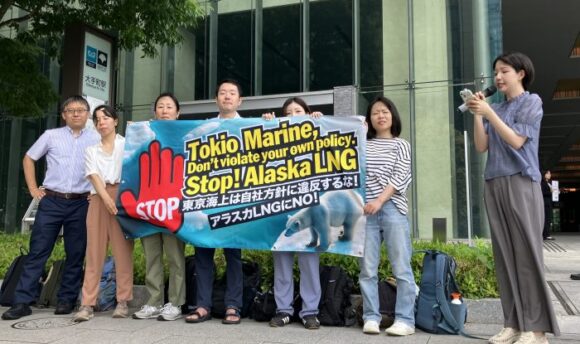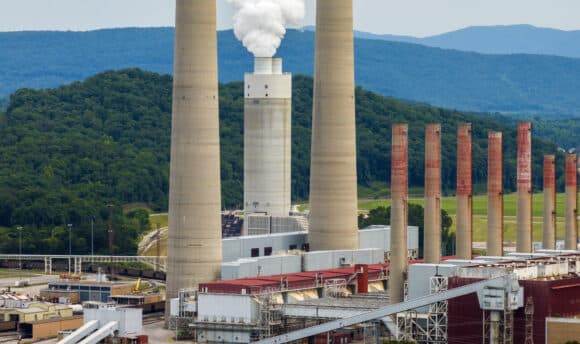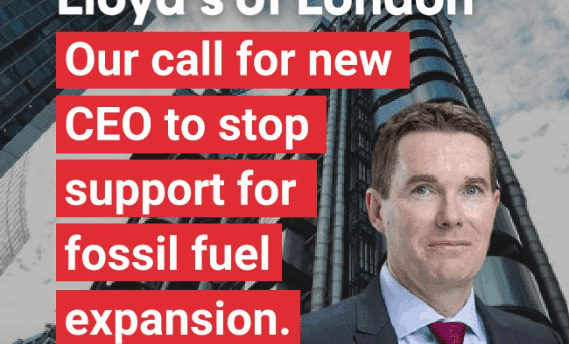Insurer adopts coal divestment policy but takes no action on syndicates
Lloyd’s new coal divestment policy affects just 2.5% of the market it oversees, leaving its syndicates free to continue business as usual with £77.5 billion exposed to climate risk, NGOs supporting the Insure Our Future campaign warned today after receiving detailed information from the insurer.
Lloyd’s has previously recognised that climate change could create stranded assets in coal, affecting “assets and liabilities in the insurance and reassurance sector”. The new policy taking effect from April 1st protects the £2 billion in its Central Fund, but it does not affect Lloyd’s syndicates, which are free to invest in and insure coal projects as before.
"Lloyd’s could and should be going so much further. This policy only applies to a fraction of the capital which underpins the market.Ultimately, it is the responsibility of Lloyd’s, and not just individual managing agents, to manage the stranded asset risks posed by coal. If either fail to do so, these risks will remain a threat to the stability of the market.”
"The Lloyd’s market continues to insure coal projects, even when other insurers are withdrawing cover for an industry that causes thousands of premature deaths each year and is fuelling dangerous climate change. This is the same market which provides liability cover for gun owners – so-called ‘murder insurance.’ In both cases the market is putting profits ahead of the people whose health and wellbeing the insurance industry is supposed to protect.”
Mark Carney, Governor of the Bank of England and chairman of the international Financial Stability Board, has warned insurers that they risk “potentially huge” losses from climate action that could leave vast reserves of fossil fuels as worthless stranded assets.
Lloyd’s new coal policy is a welcome but modest step, which remains below industry best practice in its most important provisions. It becomes the 16thmajor insurer to divest from risky coal projects, continuing a trend which has now seen commitments to pull an estimated $22 billion of investments out of the industry.
AXA announced the industry’s most progressive policies on climate change in December 2017, pledging to stop insuring any new coal, tar sands and associated pipeline projects and to adopt divestment criteria recommended by the Insure Our Future campaign. Zurich and SCOR have also gone beyond divestment and announced restrictions on underwriting coal.
On the positive side Lloyd’s adopts criteria recommended by Insure Our Future, defining coal companies as enterprises which generate at least 30% of their revenue or electricity from coal, produce at least 20 million tonnes of coal a year, or operate at least 10GW of coal-fired power stations. However, the policy has major shortcomings.
- It only covers the £1,952 million Central Fund, just 2.5% of the assets which support the business underwritten at Lloyd’s. It leaves the remaining £77.5 billion exposed to climate risk.
- It makes no commitment to divest from companies building new coal power, creating a loophole for investment in companies not captured by the divestment criteria which are developing at least 90GW of new plants.
- It makes no commitment to divest from ‘extreme’ fossil fuels like tar sands or arctic drilling, unlike industry leaders.
- It fails to cover Lloyd’s core business, offering and regulating an insurance market. It does not stipulate any measures to address the risks of underwriting coal-related business through the Lloyd’s market. It creates the risk that Lloyd’s members may fill the gap which other insurers have created by ceasing to underwrite coal projects.
Insure Our Future’s recommendations to Lloyd’s
On February 19, 2018, ClientEarth sent a letter to Lloyd’s CEO Inga Beale recommending that Lloyd’s address the coal-related risks of activities on its market by amending the Minimum Standards – the rules which all Lloyd’s members must comply with. Specifically ClientEarth proposed that Lloyd’s:
- Ensure that insurers operating in its market stress test coal and coal-related operations to identify stranded asset risks;
- Require the use of current and peer reviewed climate science in the evaluation of stranded asset risks;
- Identify the recommendations of the Task Force on Climate Related Financial Disclosures as best industry practice in regards to how its Minimum Standards are applied.
In a separate letter to Inga Beale, six environmental organisations engaged in the Insure Our Future campaign – ClientEarth, Greenpeace, InfluenceMap, ShareAction, the Sunrise Project and 350.org – recommended that Lloyd’s adopt best industry practices in the development of its coal exclusion policy. Specifically, the organisations proposed it should:
- Apply its exclusion policy not only to pure coal players, which make up a small portion of the global coal market, but to all companies which derive at least 30% of their business from coal or develop new coal infrastructure;
- Extend its policy to cover extreme fossil fuels such as tar sands and Arctic oil drilling;
- Require the member companies of the Lloyd’s market to set aside more capital to mitigate the risk of underwriting exposure to the coal sector – a practice it has applied for exposure to cyber risks.



